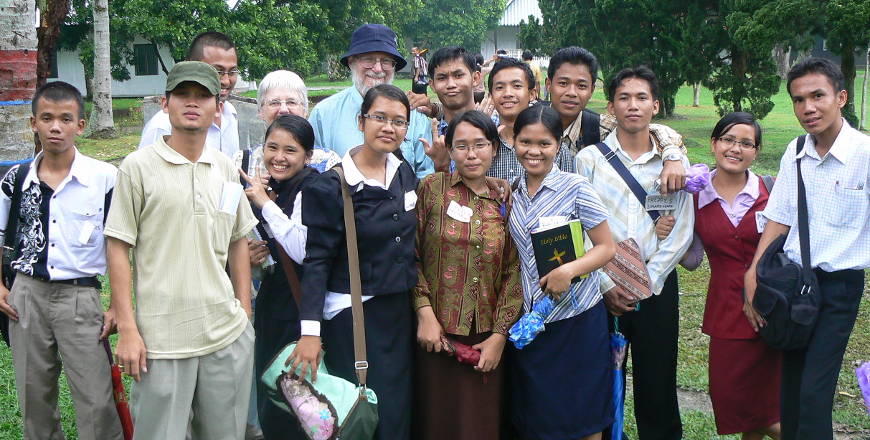We’d retired and settled into a quiet life, spending time with the family, working around the house and garden – filling in time quite nicely, thank you very much. Then bang out of nowhere we were thinking about volunteering overseas to teach English. We’d had friends around for dinner and everything was going as normal […]
We’d retired and settled into a quiet life, spending time with the family, working around the house and garden – filling in time quite nicely, thank you very much. Then bang out of nowhere we were thinking about volunteering overseas to teach English.
We’d had friends around for dinner and everything was going as normal — food, drinks, laughing, animated discussion – and then Julian said, ‘Mark, how about coming to Indonesia with me and teaching English?’
‘No way! No passports, no idea, never been overseas, don’t speak a word of Indonesian, can’t stand heat, and we’re not English teachers.’ End of discussion.
But then, after dinner, we asked Julian for a few more details. We ended up saying we’d think and pray about it. The next day at Bible study we learned that God told Joshua to be ‘strong and courageous’ because God would be with him. That was interesting. We started to think: Could God really be asking us to do this?
That’s how we started on a wonderful, interesting, challenging and delightful time in our lives. We worked with the Lutheran Church of Australia (LCA), and upon the invitation of the HKBP (Huria Kristen Batak Protestan), we went to work at Pematang Siantar in Sumatra, Indonesia. A partner church of the LCA, the HKBP has a staggering 4.2 million members!
In 2008, 2009 and 2010 we accompanied Julian Pfitzner (twice) and Rosemary Winderlich (once), to the HKBP seminary in Siantar to teach English to the first-year students. The seminary has 450 students and each year it holds a three-week orientation course for the 80-plus incoming students. Coming from all over Indonesia, they have studied English in school but they are not fluent. We were valued as ‘native English’ speakers in terms of our pronunciation, syllable stress, colloquialisms and so on. We Australians taught conversational English and reading comprehension, while a teacher from the nearby HKBP Nommensen University taught English grammar. The course concluded with the students performing concerts in English.
In 2009 and 2010 we also spent a week teaching English to pastors and office workers from another of the LCA’s partner churches, the GKPI (Gereja Kristen Protestan Indonesia). We were based at their Mamre orphanage.
Making the adjustment from Adelaide to Indonesia was quite a challenge. Everything is the same – but different! The language is different (obviously, but it was overwhelming for us). The towns are crowded; there are over 240 million Indonesians compared with 22.5 million Australians. The traffic is much busier and less ordered, and there are thousands of motorbikes. There are lots of roadside stalls. Only bottled or boiled water is safe to drink. The weather is tropical and the farms are lush green with rice, maize and bananas. But the classrooms are the same as I remembered them from earlier teaching days, (only with whiteboards now, not blackboards), and the churches reminded me of my childhood in the Barossa Valley.
To the Indonesian people we were also the same, but different. Taller and light-skinned, we stood out in the crowds. Girls posed with us for photos on their mobile phones. Many people stared. Children followed and pointed, and some babies cried!
Despite our limitations and concerns about our abilities, we enjoyed the experience and were encouraged to return. The new intakes of seminary students were always cheerful, polite and respectful, but at first were quiet and reluctant to respond. That was understandable, since they, too, were in a new situation and didn’t know us or their fellow students. As the course progressed and relationships developed, the students grew in confidence and became delightful, and imaginative, responsive friends. Despite their limited English, they chatted with us over morning tea, they supported each other and got involved enthusiastically in the concerts.
With the smaller pastor/church worker group at GKPI, we were able to form closer relationships and shared jokes as well as some in depth discussions on families, work and theological ideas.
The two groups looked after us well. They were generous with their time and care. We were shown some of the sights and were escorted to the shops and markets. We were taken to worship at a number of churches, to the zoo, to the grave of Nommensen (the renowned missionary to the Batak people), to a weaving factory, to feast on some delicious Indonesian meals (it helps if you like rice and chilli), to a tea plantation and to relax at the largest volcanic lake in the world, Lake Toba.
Our greatest pleasure was the experience of being part of the family of Christ in Indonesia and making many new friends. We worshipped and sang hymns together (Batak people have a real gift for singing and music); we read the Bible and we prayed together. We were one in the body of Christ, all renewed as God’s children by grace, all part of his family.
If you would like to consider the opportunity to serve as a volunteer in mission, serving in practical ways, teaching English, teaching in the seminaries and institutions of our partner churches, or in local churches, you are invited to phone Nevin on (08) 8267 7300 or email nevin.nitschke@lca.org.au. For more information, go to https://www.lcamission.org.au/join-gods-mission/volunteer/
Read more stories about volunteering at https://www.lcamission.org.au/category/join-gods-mission/volunteers/


0 Comment